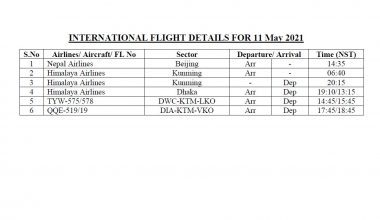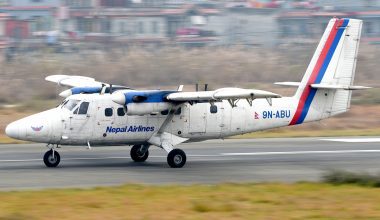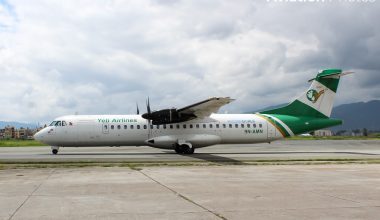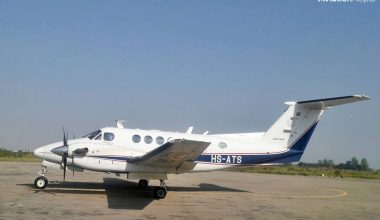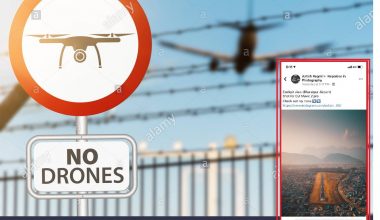Since the government gave permission to start national and international flights from August 17, airlines have opened ticket bookings.
[the_ad id=”28989″]However, air transport is starting to get a bit more sluggish than before. Civil Aviation Authority of Nepal has publicly disclosed the guidelines for health safety that must be implemented for passenger, airline, and airport operations.
Raj Kumar Chhetri, Deputy Director-General of Civil Aviation Authority of Nepal, told that a committee is working towards making compliance with the directive efficient and to determine which destinations to allow in the first level. According to him, in the first step the committee will suggest which destinations should be opened, and the authority should decide on the same basis.
[the_ad id=”28989″]There are plans to open restricted destinations in the slope failures process, according to the Deputy Director-General Chhetri. But proposals are underway at open destinations for allowing passengers to travel in full seats.
Lowering the number of travelers in the seats would render the fare quite costly, so it’s determined to continue the passengers in the whole seat by adopting health safety guidelines. The air fare is said to be cheaper effectively because the price of aviation fuel has come down and the budget has also eliminated the infrastructure tax on aviation fuel.
[the_ad id=”28989″]Tribhuvan International Airport’s passenger capacity is on record of 1300 per hour, during normal circumstances. But the operation would have to bring upwards of double the capacity, causing congestion during embarkation and disembarkation at the terminal. It is said that to maintain social distance the number of flights will be fixed, and the terminal will not be too crowded. CAAN has said the number of flights per hour would be determined on the advice of the committee.
For this, CAAN, airports and airlines have also practiced the rules to be followed by passengers, flight attendants and ground staffs during air travel.
Following 17 August, CAAN plans to operate flights to all domestic airports. While at the same time not all countries in international destinations. After evaluating the risk of infection with coronavirus, the first step of flight will start from the safest destination, said Chhetri, deputy director-general.
[the_ad id=”28989″]Passengers will no longer only need to get a ticket and boarding pass during the flight, each passenger will be asked to fill out a form to access their details. Even foreign travelers would keep their current travel information.
It is compulsory to wear a mask on the board during the flight. There are guidelines at the entrance to the airport for social space, fever measure, use of a sanitizer, or compulsory hand washing. Passengers with cold, 100.4-degree fever, breathing difficulties, taste, and odor-related health conditions close to COVID 19 are not permitted onboard. Passengers over the age of 70, pregnant women, and people with severe health problems have been advised not to fly as much as practicable.
Inflight catering on domestic flights is discontinued. This facility will have only available on international flights. Animal movement from aircraft was prevented. Trolleys can only be used at the airport in case of an emergency.
CAAN has also indicated to the airlines that check-in and boarding passes will be as paperless as possible. Such a provision was brought to the airport so that one person will not have to come into contact with another. Also inside the airport, facilities and markings were made for social distance.
[the_ad id=”28989″]Since about August 17, Tribhuvan International Airport has initiated preparations to operate up to 15 international flights daily. Airport manager, Devendra KC, said the airport was in a position to operate up to 15 flights a day taking into account the possibility of infection.
He said the airport would be advised of minimal flights because it will take a little longer to depart and arrive at the airport than normal. Through implementing health safety requirements, the Government agreed to resume domestic and international flights from August 17.
The airport, however, has not yet taken a formal decision on how many flights will be scheduled daily after August 17. Nonetheless, KC said more than 15 flights a day could not be conducted considering the possibility of infection. He said thirty to forty domestic flights could be operated daily.
[the_ad id=”28989″]He said that there will be preparations for international passengers to depart the airport at least four hours before the time of departure.
Airport manager KC said that the tools needed to implement health safety should be increased. He said that there is enough manpower at the airport but services should be added to reduce the risk of infection. He said other country’s domestic airports were also planning for the flight. He explained that all of the country’s airports must operate by following basic standards of health safety.

